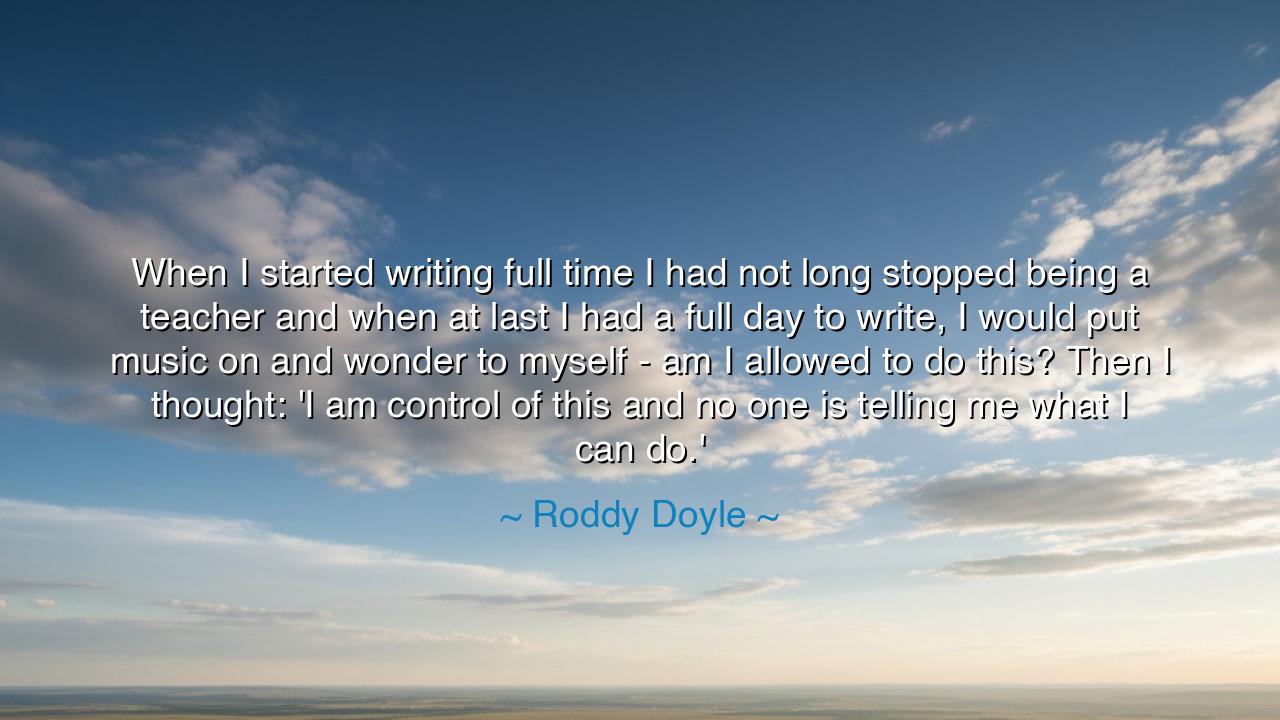
When I started writing full time I had not long stopped being a
When I started writing full time I had not long stopped being a teacher and when at last I had a full day to write, I would put music on and wonder to myself - am I allowed to do this? Then I thought: 'I am control of this and no one is telling me what I can do.'






Hear the words of Roddy Doyle, the Irish storyteller who gave voice to the streets and the ordinary heroism of common lives: “When I started writing full time I had not long stopped being a teacher and when at last I had a full day to write, I would put music on and wonder to myself—am I allowed to do this? Then I thought: ‘I am in control of this and no one is telling me what I can do.’” This is no mere recollection of a writer’s habit, but a testament to the discovery of freedom, the breaking of chains, and the dawning of responsibility when a man claims his calling.
For Doyle had walked long under the yoke of discipline, bound by the schedules of classrooms, the demands of others, the strict rules of labor. To be a teacher is noble, yet it is a life ruled by the needs of many voices, by bells that divide the day, by authorities that dictate what must be said and done. When at last he laid aside this mantle and took up the pen as his sole vocation, he found himself astonished at the vastness of his freedom. No one commanded him to begin, no one ordered him to stop, and the silence was both exhilarating and terrifying.
This moment is familiar to all who step out from servitude into self-mastery. Recall the tale of Cincinnatus, the Roman farmer called to save his people. When victory was won, he laid down the sword and returned to his plow, master of himself, choosing freely the life of simplicity. Or think of the freed slaves of every age, who after bondage must ask themselves: what now? Freedom is not only release, but also the burden of choice. Doyle, seated with music in the air and the empty day before him, felt that burden: “Am I allowed to do this?” The answer, whispered from the depths, was: “Yes—if you dare to govern yourself.”
For true control is not given, it is taken. To be told what to do is easy; to decide what to do is hard. Many dream of freedom, yet when it is placed in their hands, they shrink, longing again for the safety of orders and routine. But Doyle chose differently. He embraced the silence, claimed the day, and declared: “I am in control of this.” In that moment he became not only a writer of stories, but the author of his own life.
The lesson is clear: to follow your calling, you must not wait for permission. No one will tell you that the time has come to write, to paint, to build, to dream. The world is filled with voices of command, but they are not the voices of destiny. The true path is marked by your own choice, your own courage to say, “This is mine, and I will shape it.” Doyle’s journey from teacher to writer is the journey of all who dare to claim their freedom and bear the weight of their own decisions.
Yet this lesson is not without warning. Freedom is not idleness. It is not drifting in ease, but the discipline of self-direction. Doyle’s discovery was not simply that he could put on music, but that he could work without another’s hand guiding him. To be in control is to labor with more intensity, for no master drives you but your own will. The danger of wasted days looms large, yet so too does the glory of days filled with creation.
Therefore, O seekers, learn from Doyle’s revelation. Do not ask, “Am I allowed to do this?” Ask instead, “Am I brave enough to take command of my life?” If the answer is yes, then live boldly. Fill your hours with the work that calls to you, not the work that cages you. And remember: freedom is not a gift from others, but the victory you win each day when you choose your path, your labor, and your destiny. To live in this way is to live as an artist of life itself—shaping not only words upon a page, but the very story of your being.






AAdministratorAdministrator
Welcome, honored guests. Please leave a comment, we will respond soon